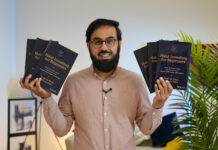I’ve been hearing so many people wax lyrical about Jeremy Scahill’s Dirty Wars that I thought I’d better watch it. And frankly when I did I was a little bit disappointed, writes Roshan Muhammed Salih.
This is essentially a pre-Arab Spring film which doesn’t tell us anything we didn’t already know, and the self-promotion of its presenter left me very cold.
That said, for western audiences who want to learn more about the US’s self-defeating War on Terror this is an excellent eye-opener. But for Arab and Muslim audiences who live and breathe this stuff every day I think this documentary is at least a few years outdated.
War on terror
Scahill starts his investigative journey in Afghanistan where he uncovers testimony from Afghan villagers who were subject to a murderous raid by a mysterious bunch of bearded American soldiers.
Initially the Americans deny any such raid took place but then they change their tune and apologise for the “mistake.” This leads Scahill to uncover the secretive US army unit – JSOC – who were behind the raid, a crack unit that carries out “targeted assassinations” and is answerable to the White House alone.
Back in America no one is willing to answer Scahill’s questions about JSOC so he the travels to Yemen to discover that they are conducting extra-judicial drone attacks against al Qaeda targets. One of the people in their crosshairs is Anwar al Awlaki, an American citizen who is now supporting jihad against the United States.
Subscribe to our newsletter and stay updated on the latest news and updates from around the Muslim world!
Later, while Scahill is investigating JSOC’s operations in Somalia, al Awlaki is killed by a US drone strike and a few days later so is his 16 year old son.
Then suddenly after Osama bin Laden is killed in 2011 by a JSOC strike force the secrecy is lifted on the unit and they become all-American-heros.
Mixed feelings
Dirty Wars is beautifully filmed and brings to life the dramatic sights, sounds and smells of the Afghan landscape, the Yemeni streets and markets, and the Somalian war zone. It is also the product of serious and sometimes very dangerous research and field trips.
And it undoubtedly exposes the indiscriminate, unilateral, extra-judicial and self-defeating nature of the US’s War on Terror which is creating many more enemies than it is eliminating. To his credit, Scahill also humanises the victims in a very effective way.
Therefore, perhaps Dirty Wars will become the major War on Terror film which tells the “other side of the story” in a way that appeals to a mass audience.

Nevertheless, I can’t help feeling that Dirty Wars is somewhat over-rated and cannot understand why so many Arabs and Muslims are getting so excited over it.
Firstly, Scahill disappointingly portrays himself as some kind of “journalist-hero” who’s on a crusade to uncover the truth at great personal cost. The endless shots of him “being reflective” or “investigating” begin to grate after a while. Personally I am getting rather fed up with the “white saviour” myth and think the War on Terror victims should be the stars of the film and not him.
And secondly, the last three years of the Arab Spring have rather left his narrative behind. Most of us already know about US targeted and extra-judicial assassinations in Afghanistan and Yemen. But what do we know of JSOC activities in places such as Libya and Syria? What do we know of how US strategy has evolved since the Arab Spring began? What do we know about how the US is actually working with al Qaeda now in certain places where their interests coincide?
So in conclusion, I would recommend that you go and see Dirty Wars because it’s an interesting film which can teach the layman a lot about the War on Terror. But just don’t claim that it’s the greatest documentary to ever hit our screens or that it’s directly relevant to the present day situation in the Arab and Muslim world.
Dirty Wars is available to watch on Netflix.
@RMSalih













![The Taliban’s Road To Success [Short Film]](https://5pillarsuk.com/wp-content/uploads/2024/11/Kabul-roadworks-thumbnail-100x70.png)





